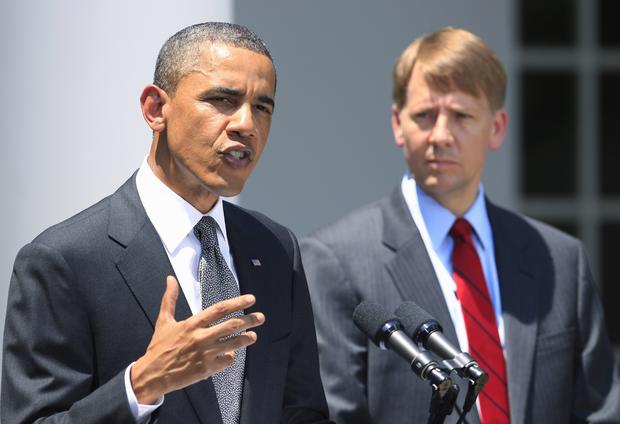White House launches media blitz to push consumer bureau nominee
The White House is launching a lobbying campaign this week for the confirmation of Richard Cordray as the head of the Consumer Financial Protection Bureau (CFPB), despite indications that Senate Democrats lack the congressional strength to overcome a Republican filibuster on the vote.
The Senate is expected to vote on Cordray's nomination as early as Thursday. But a White House statement targets some Republicans for vowing to "block his nomination without raising question about his qualifications or background" - which the administration argues is a disservice to the public .
As a result, the Obama administration is pushing forward with a media offensive aimed at educating voters in seven targeted states about the bureau in general, and "the consumer protections that would be put in place if Mr. Cordray is confirmed and the tangible consequences for families in those states."
The CFPB, which was created as a result of the Dodd-Frank financial reform act and established by consumer advocate Elizabeth Warren in 2010, is tasked with writing some of the new rules dictated by the Wall Street reform legislation, as well as supervising and enforcing the rules that guide non-bank financial firms, such as payday lenders.
But it has faced steady opposition from Republicans since, who argue that the bureau's structure insufficiently allows for accountability and transparency, and who largely object to the Dodd-Frank bill altogether.
Even before Cordray's nomination, 44 Republican Senators - four more than are needed to filibuster a nomination - in May signed a letter to President Obama pledging to block any nominee barring a drastic restructuring of the CFPB. One of the restructuring moves for which they called was the elimination of the director position altogether.
In a conference call with reporters on Sunday, White House spokesman Josh Earnest said Mr. Obama himself "will devote a special effort to communicating with citizens" in Alaska, Indiana, Iowa, Maine, Nevada, Tennessee and Utah to talk about the benefits they might be privy to pending Cordray's nomination, according to Politico.
Earnest noted that mayors and other elected officials from those states would "publicly make the case for Mr. Cordray's nomination" throughout the week, as will White House officials and the president.
While Earnest told reporters that the administration hopes their efforts could sway some Republicans "on the fence" about "whether they're going to side with the financial industry and block Mr. Cordray," it is unlikely that the White House's media blitz will make a significant impact on the Senate vote.
The White House also put out an 11-page memo highlighting "the importance of a CFPB director" and the CFPB overall.
Michael Brumas, a spokesman for House Minority Leader Mitch McConnell, R-Ky., told Hotsheet in that the Senate Republicans will continue stand by the letter their May letter because "the White House hasn't responded to our calls to change the structure of the bureau."
"That's basically still our position," Brumas said. "The letter still stands."
Brumas said the GOP objection had nothing to do with Cordray as a candidate.
"The whole time it's been about the agency and not the candidate," he said. "We'll be making the point that this is a bureau that is in dire need of accountability and transparency and that's what Republicans are interested in seeing happen before someone gets confirmed to that position."
Still, if the confirmation fails - which most expect it will - the Obama administration will likely target those Republicans who voted against it in the 2012 elections.
Of the seven states being targeted by the Obama administration for the campaign, seven are home to Republican Senators facing re-election campaigns. Nevada's Republican Senator Dean Heller, who was appointed to the seat after the resignation of Sen. John Ensign, looks to face a tough challenge from Democratic Rep. Shelley Berkley. Meanwhile, in Maine, moderate Republican Sens. Susan Collins and Olympia Snowe - the latter of whom faces re-election - both voted for the Dodd-Frank act.
